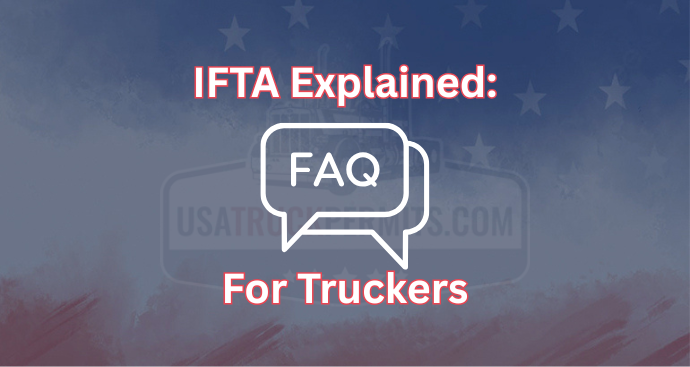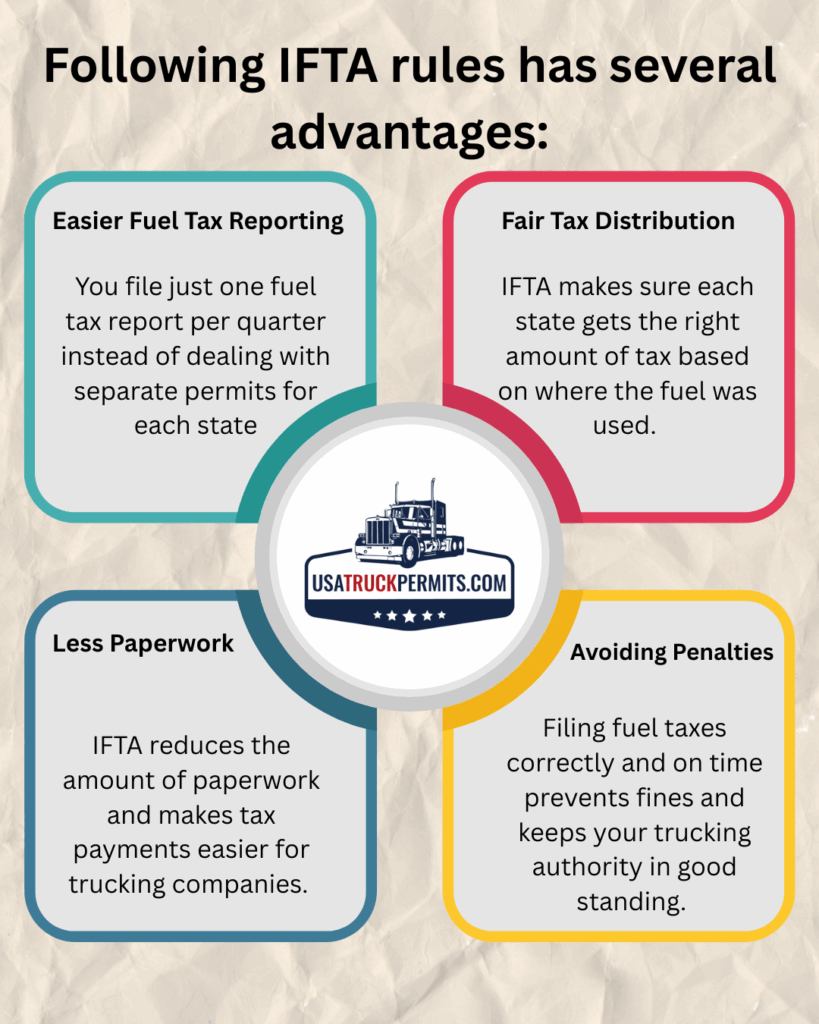
The International Fuel Tax Agreement (IFTA) is a key rule in the trucking industry. It helps trucking companies report and pay fuel taxes more easily. If your trucking business operates in more than one state, you must follow IFTA rules to avoid fines and keep your business running smoothly.
Btw, if you wish to start a trucking company in US, we can help you. Please feel free to connect with us via call or filling our contact form.
Going back to topic.
Fuel tax reporting can be confusing, but IFTA makes it simpler. Knowing how it works helps you stay compliant, avoid penalties, and make your operations smoother. This guide explains IFTA licensing, compliance, and reporting to help keep your business on track.
Key Points:
- What is IFTA? A system that makes fuel tax reporting easier for interstate truckers.
- Who Needs It? Trucks over 26,000 lbs or with three or more axles that cross state lines.
- Why Does IFTA Exist? To simplify road taxes and distribute them between states
- How to Apply: Submit your business and vehicle details through the IFTA application for your home state.
- Common IFTA Mistakes: Poor mileage tracking, missed deadlines, and incorrect tax rates.
- Get Help: USA Truck Permits can help with IFTA application, compliance and tax reporting.
What is IFTA?
IFTA is an agreement among 48 U.S. states and 10 Canadian provinces. It helps trucking companies report and pay fuel taxes in one place instead of applying for permits in every state they drive through. Before IFTA, truckers needed separate fuel tax permits for each state, which was a hassle. With IFTA, your home state gives you a license and decals, and you file one IFTA tax report each quarter.
Who Needs an IFTA License?
You need an IFTA license if your vehicle meets one of these rules and travels in more than one state:
- Has two axles and weighs over 26,000 pounds.
- Has three or more axles, no matter the weight.
- Used in combination and the total weight is over 26,000 pounds.
Not having an IFTA license, missing reports, or failing to pay fuel taxes on time can result in fines or having your license suspended.

Why Does IFTA exist?
Following IFTA rules has several advantages:
1. Easier Fuel Tax Reporting
You file just one fuel tax report per quarter instead of dealing with separate permits for each state.
2. Fair Tax Distribution
IFTA makes sure each state gets the right amount of tax based on where the fuel was used.
3. Less Paperwork
IFTA reduces the amount of paperwork and makes tax payments easier for trucking companies.
4. Avoiding Penalties
Filing fuel taxes correctly and on time prevents fines and keeps your trucking authority in good standing.
How to Apply for an IFTA License
Apply for an IFTA license through your home state’s Department of Motor Vehicles or Tax Office. You will need:
- Business details (name, address, and USDOT number).
- Vehicle details, including VIN and weight.
- Estimated fuel usage and miles driven.
After approval, you will get an IFTA license and decals. These decals must be placed on each qualified vehicle and renewed every year.
IFTA Reporting and Compliance Rules
To follow IFTA rules, trucking companies must:
- File Quarterly Reports: You must report total miles driven and fuel purchased in each state every quarter.
- Keep Accurate Records: Track mileage and fuel purchases carefully using an electronic logging device (ELD) or GPS.
- Pay Any Owed Taxes: If you owe more fuel taxes than what was paid at the pump, you must pay the difference.
IFTA Filing Deadlines
Missing a deadline can result in penalties. Here are the due dates for IFTA filings:
- Q1 (January – March): Due April 30
- Q2 (April – June): Due July 31
- Q3 (July – September): Due October 31
- Q4 (October – December): Due January 31
Avoiding Common IFTA Mistakes
To stay compliant and avoid costly errors, follow these steps:
1. Track Mileage and Fuel Purchases Accurately
- Use ELDs to record trip mileage automatically.
- Keep all fuel receipts and note where fuel was bought.
2. File Quarterly Reports on Time
- Late reports result in fines and possible suspension.
- Set reminders for filing deadlines.
- Use a trusted trucking permit company such as USA Truck Permits
3. Keep Detailed Fuel Receipts
- Save all fuel receipts for at least four years in case of an audit.
4. Check Tax Rates
- Fuel tax rates change often, so always check for the latest rates before filing.
IFTA Audits: What You Should Know
Trucking companies can be chosen for an IFTA audit at any time. Common audit triggers include:
- Incorrect mileage and fuel records.
- Missing or poor record-keeping.
- Repeated late filings or missed payments.
To prepare for an audit:
- Keep clear records of mileage logs, fuel receipts, and tax reports.
- Use tracking tools to avoid errors.
- Make sure your reports match your actual fuel purchases and miles driven.
Get Expert Help with IFTA Compliance
Managing IFTA rules can be complicated, but USA Truck Permits makes it easier. Our My Trucking Manager program helps keep track of the following:
- IFTA license applications and renewals.
- Accurate quarterly tax filings.
- Monitoring compliance to prevent penalties.
- Additional permits that are required to be renewed
Final Thoughts
Understanding and following IFTA rules is important for trucking companies. Keeping good records and filing reports on time can save money and prevent fines.
Need help with IFTA licensing and fuel tax reporting? Contact USA Truck Permits today to make compliance easier and keep your business running smoothly!